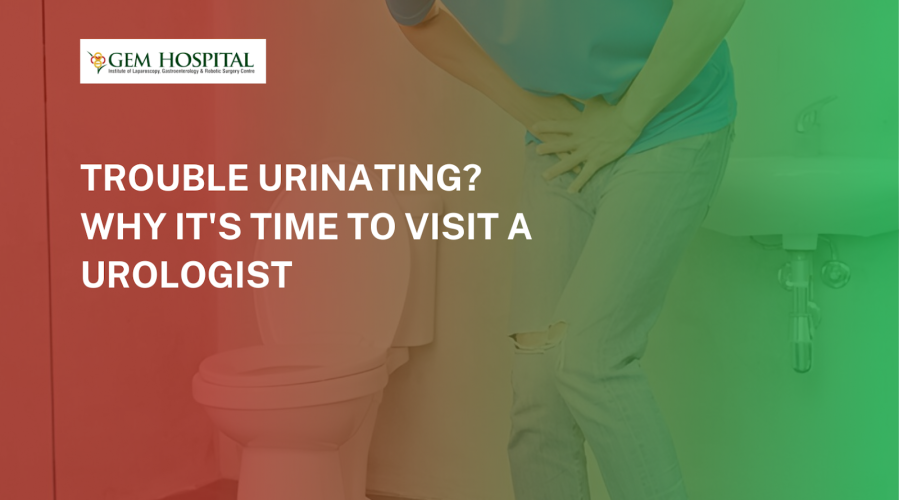Learn how to prevent jaundice during the rainy season with simple safe water practices and healthy food habits. Discover key hygiene measures, diet precautions, and monsoon safety tips to protect your liver and overall health.
Trouble Urinating? Why It's Time to Visit a Urologist

Talking about problems with urination can feel subjective and even shameful for some. But if you are having difficulty urinating, it is more than an inconvenience. It could signal a health issue needing professional help. It may be reduced flow of urine, feeling like we can't start to urinate, feeling like we can't empty our bladder, or more. Even if we experience any of these issues from time to time, they shouldn't be ignored.
In this blog we will look at common causes of trouble urinating, deciding if and when you should see a urologist and what you can expect when you do. If you have trouble urinating, you are one step closer to relieving your symptoms.
What Does “Trouble Urinating” Actually Mean?
Trouble urinating can manifest in different ways for different individuals. You may notice:
- A weak or interrupted urine stream
- Difficulty starting urination
- A frequent urge to urinate, especially at night (nocturia)
- A burning sensation while urinating
- Dribbling after urination
- The feeling that your bladder isn't completely empty
- Pain or discomfort in the lower abdomen or pelvis
While these symptoms might seem manageable at first, they can worsen over time and point to more serious issues. Understanding the trouble urinating causes is key to finding the right treatment.
Common Causes of Trouble Urinating
Trouble urinating can be caused by a variety of health issues. Below are the most common:
1. Benign Prostatic Hyperplasia (BPH)
BPH occurs when the prostate gland enlarges, but is not cancer. It is relatively common in men over the age of 50. As the prostate enlarges, it presses against the urethra, which can block or cause a partial blockage of urine drainage. Symptoms are weak stream, difficulty starting to urinate, and the need to urinate more frequently at night.
2. Urinary Tract Infections (UTIs)
UTIs: Women typically experience more urinary tract infections due to anatomy, but men can also have UTIs. In particular, UTIs affect the bladder and/or urethra, causing inflamed and irritated tissues that can occur in urinating that requires more effort, and is usually painful.
3. Urethral Stricture
Urethral Stricture: A narrowing of the urethra that can be a result of injury to the urethra, infections, or residual inflammation. The reduction or blockage of urine drainage is possible and may require surgery.
4. Kidney or Bladder Stones
Stones can block the urinary track and result in sudden difficulty with urination and excruciating pain. They can lead to serious infection or damage to the kidneys if untreated.
5. Neurological Disorders
Nerve disorders such as multiple sclerosis, Parkinson's disease, spinal cord injuries, or strokes can interfere with bladder control, especially with starting or stopping urination.
6. Prostatitis
The prostate gland can become infected or inflamed, resulting in painful urination, difficulty emptying the bladder, or pelvic pain. The inflammation can be caused by bacterial infection or other causes.
7. Medications
Certain medications, especially for allergies, depression, and blood pressure, can affect bladder function. Be sure to inform your provider of all medications, vitamins, and supplements if you experience urinary issues.
When Should You See a Urologist?
Not all urinary issues require emergency care, but you should consult a urologist if:
- Symptoms persist for more than a few days
- You notice blood in your urine
- You're experiencing pain or fever
- You have a history of urinary tract issues or surgeries
- Urination becomes increasingly difficult or impossible
Early diagnosis often leads to simpler treatment and prevents complications. Delaying care can result in infections, bladder damage, or kidney problems.
What Happens During a Urology Consultation?
When you visit a urologist, they will start with a detailed history and physical examination. They may recommend the following tests:
- Urine analysis – to detect infection or blood
- Ultrasound or CT scan – to visualize the bladder, kidneys, or prostate
- Uroflowmetry – to measure the speed and volume of urine flow
- Cystoscopy – to visually inspect the bladder and urethra
Based on your results, the doctor will guide you toward a personalized treatment plan, which may include medication, lifestyle changes, or minor procedures.
Don’t Ignore the Symptoms
Ignoring urinary problems can lead to chronic discomfort and serious health issues. Early intervention can lead to better success outcomes and preserve overall health. If you are having trouble urinating, do not wait until the problem worsens.
Trust GEM Hospital for Urology Care
At the GEM Hospital, we understand how distressing urinary issues can be. Our urologists will work with your diagnosis, use advanced diagnostic tools, and come up with treatments specific to you. Our experts aim to help patients find relief that lasts. Whether it's a simple infection or a more complicated urological problem, we want to help you recover with compassion and confidentiality.
If you're experiencing a problem with urinating don't wait. Book your appointment at GEM Hospital today and take the first step toward a healthier, more comfortable life.
Blogs & Article
Understand why rainy weather may trigger gall bladder pain. Explore the causes, symptoms, and essential precautions to manage discomfort during monsoon season. Learn how humidity, diet changes, and infections influence gallbladder health.
Discover essential rainy season diet tips for patients with fissures and understand why gallbladder pain increases during the monsoon. Learn what foods to avoid, what to include, and how to maintain digestive health in humid weather.


